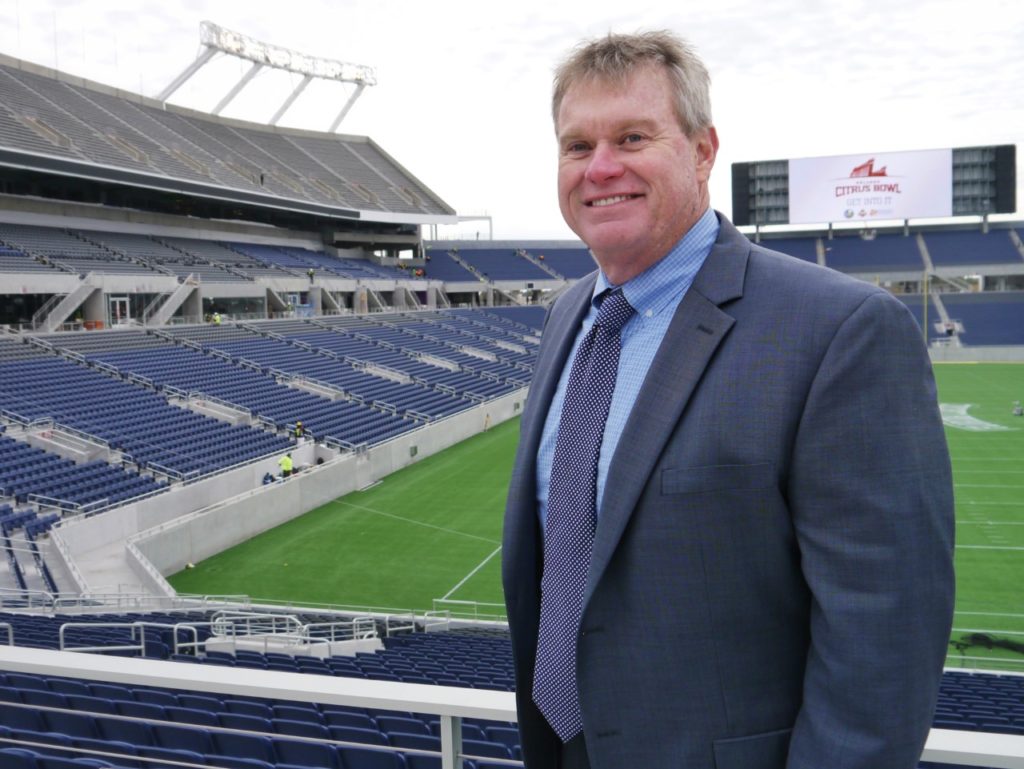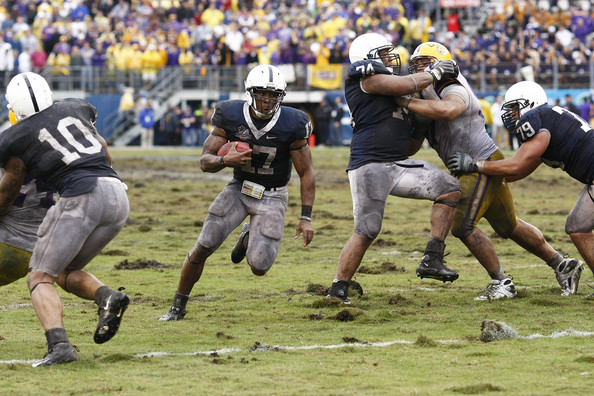Mother Nature and the media walloped Allen Johnson Jan. 1, 2010 when Citrus Bowl stadium hosted what became known as the “Mud Bowl.” The executive director of Orlando Venues learned a lot that year about covering all your bases and making sure everyone is doing their job.
In December 2009 the Citrus Bowl [now Camping World Stadium] hosted Florida’s high school football championships. They had won the bid for those games years earlier and, given their experience and mission, did not think six games over three days would be a problem on their natural turf field.
However, that December set records as the wettest and coldest on average in Florida.
As soon as they finished the high school football games in early December, Johnson was called to a meeting with his stadium superintendent, head groundskeeper and the representative from Florida Citrus Sports who puts on the Bowl games at the Citrus Bowl, including the premiere Capital One Bowl Game on New Year’s Day, preceded by the Champs Sports Bowl. They walked the field and agreed it was “a little wet.”
“These high schoolers in Florida, they’re not 120-pound little wingbacks anymore,” Johnson said. “They are 250-pound drivers who will play at Division I colleges. And the other thing is, they spend the bulk of the game between the 35s (yard lines). That’s the sweet spot for them.”
That day, the knowledgeable executives walked the field and made an agreement to re-sod end zone to end zone. They knew it could be done because Orlando had an annual contract with a sod field in the Tampa area. They grew grass for the city and kept it until it was needed. Orlando Venues then bought it on demand.
That’s when circumstance joined Mother Nature in beating Johnson up. “Unbeknownst to me, we had a new purchasing director for the city of Orlando who nullified all annual contracts and made them all be rebid. Our sod field deal was considered an annual contract and was canceled. No one informed me. We didn’t get any bid out. It just flew under the radar.”
The trusted and longtime sod farm had no sod to sell them.
He turned to his turf consultant who advised they could issue a quick RFP and bid it overnight. It was tight. It was Dec. 15 and they had the Champs Sports Bowl on Dec. 27, prior to the Capital One Bowl on Jan. 1.
The request for proposals was hurried through, specifying the city required sod that was ¾-inch thick, had six months plus mature growth and came in sheets of 48 feet (domestic/residential sod comes in 24-foot sheets). “We needed four-foot pieces so there are less seams to worry about growing together,” Johnson said.
The turf consultant, grounds manager and superintendent (stadium manager) were all doing the inspection required to take out the old sod and replace it with the new sod.
As advised, they found a sod farm which said they could meet the specs, albeit for $1.20 a yard compared to 60 cents under the annual contract. “The only sod they’re growing in December in Florida is for golf courses or stadiums. Everyone tells me it’s fine,” Johnson said.
The sod was delivered and installed, when suddenly Johnson gets a call from his contact at Florida Citrus Sports.
“Have you seen this sod?”
“No, but I’m coming over for a meeting this afternoon, so I’ll stop by and look at it.”
And that afternoon the conversation with his groundskeeper and consultant and superintendent went thus:
“What’s going on?”
Groundskeeper: “Well, if we hadn’t gone cheap, we would have gotten the good stuff.”
“What are you talking about? We paid double.”
“This is less than half an inch thick and maybe three months of growth. It hasn’t sunk down into the mat; we can only hope for some growth now.”
“We can get growth in December if we have the right weather. Okay, put the green paint on it if it needs it. We’re not the first stadium that’s done that. If you have a brown spot, you paint it for TV.”
For the next week, while they hoped for growth, it rained every day. On Dec. 27, they play the first football game on the new sod, Miami vs. Iowa, and the field was tearing up, actually coming up in clumps. The best that could be said was, “we finished the game.”
Johnson calls another meeting in the stadium manager’s very small office, gathering the same group that had agreed to re-sod.
“We have to do something about this. Where’s our consultant?”
“I think we can tamp it down. We’ll bring the helicopters in to dry it and add giant commercial fans on the side,” the consultant says.
And that’s what they do: the best they can do.
Very quickly it’s Jan. 1, featuring the premiere bowl game, LSU versus Penn State (where the famous Joe Paterno coached) on national TV on ABC. It starts raining at 5 a.m., the game is at 11.
“We’re out there doing a lot of praying. The field is actually floating in some places, sod didn’t get deep enough and didn’t take to the dirt beneath it. So much water was draining down, it couldn’t take root,” Johnson saw.
They decided to cancel the pre-game band show and let the players warm up on the side and then play the game.
Henceforth, that game was known as the Mud Bowl. “By the end of the game, it was in pretty bad shape,” Johnson acknowledged. Among bloggers, media and broadcasters, Citrus Bowl was a national laughingstock.
All during the game, ESPN kept sending a producer over to have Johnson go live on TV. He resisted. “It’s not going to happen. I denied who I was the first three times, sometimes I go by Walter Johnson, not Allen. I avoided them forever,” he remembered.
Finally, ESPN Sportscaster Erin Andrews walked up to Johnson, who was standing on the sideline. She didn’t have a microphone or camera in his face. He thought they were chatting.
“I hear you’re the stadium manager.”
“You could call me that today; that’s not my title.”
“Well, how’s the field draining?”
“We have drains in there. It’s draining. It’s just not draining very fast. It hasn’t stopped raining very fast either.”
Suddenly, the phone in Johnson’s back pocket starts vibrating. What the heck?
“We appreciate you going on camera.”
“No, no we have a city policy that everything has to be cleared through the Mayor’s press secretary.”
“Is he or she working on New Year’s Day?”
“I don’t know. I can give you a number to call at the office and see.”
As Andrews departs, Johnson answers the other call. Lo and behold, they had used a camera from across the field to zoom in on Andrews and Johnson. She had a microphone which she was holding down by her leg. They got a live clip of that exchange. To this day, Johnson has not seen what they used. By then it didn’t matter. He had lots of media interviews coming up.
They finished the game and Johnson started thinking about the Under Armour football game coming up in mid-January. What would they do?
“After the game we gathered. I was embarrassed and I was maybe angry. We did our best. I started investigating. I had to know what went wrong and how we could fix it in 10 days.”
He called in his consultant and all his stadium staff. He had sought pre-meeting advice from peers in the business he trusted.
The superintendent says the sod came in less than six inches thick, cut in 24s instead of 48s and was thinner than it should be.
“Why didn’t we reject it?”
Consultant: “Frankly, you didn’t have any other choice for sod. You canceled your annual contract and we didn’t have any sod for you. I watched them cut it in the field. It was okay when it was being cut in the field. I work for them, too.”
“You’re my consultant and you work for the sod field and you’re supposed to be watching what they do to be sure I get the product I paid you to get? I don’t need your advice anymore.”
That Monday, Johnson did six back-to-back TV interviews. It was brutal.
“Should someone be fired? Should you be fired?”
“We owned up to it, took responsibility. I said we made a decision that we thought was in the best interest of the bowl games. It was a collective decision, five or six people including a turf expert.
“You can’t blame anybody. You have to say we messed up, we’re sorry, forgive us, we’ll do better in the future.”
He also made the decision then and there to get an artificial turf. The Citrus Bowl does not have a home team or college team, and they do a lot more than football. College football stadiums don’t have Monster Jams or band competitions on their fields. They only have six home football games.

“If I’m going to be multipurpose, the economic driver that we are with all the concerts we have, I had to have a product that was more durable,” Johnson decided.
“I did a lot of research and ended up with a great product that is well received and has performed well. But yeah, I learned a lot from the Mud Bowl.”
First was to work closely with your purchasing agent. “They just can’t slide canceling contracts by you. I have people that do that.”
LESSONS LEARNED:
• Make sure the people that work for you are doing their job to the best of their ability and if they don’t have the resources they need, they need to raise their hand and tell somebody. “At the time there was a gap between myself and my stadium superintendent. It’s something I inherited. Even now, he answers to another person before he answers to me. But he needs to be competent and confident enough, emphasizing confident, to make decisions.”
• If you have a consultant, make sure he’s working for you and doesn’t have a special interest.
• Always have a contingency plan. The existing sod would have been better than the new field. It had a little growth and roots. The killer was it was cold and raining. There was damage from high school football, but nothing compared to the new sod, which also earned the moniker, Capital One Bog.
• Have the best product for your situation. Sometimes the low bidder may not be the best option. We have strict state rules and local guidelines and charter. But there are ways to write a strong enough RFP or RFQ, with well-prepared, no-wiggle-room specs, that you can reject based on not meeting the minimum conditions. These specs were written quickly by someone not qualified, which is why the sod company got by with what they did.
• When dealing with the press, be forthright, apologetic, “we will do better. We get praised together and we get criticism together. They say ‘Pitcher, pitcher, no hitter,’ but someone had to catch and field balls so he could have a no hitter.”
Everyone who has a stadium has some kind of story – a pipe burst, a power outage – maybe not as nationally infamous as Johnson’s Mud Bowl. But there is a bonus to it.
“We got the money in 2014 to redo the stadium and we did it in 9 months. My boss calls it the best NFL stadium that doesn’t have an NFL team. But we do have the NFL Pro Bowl and two premiere bowl games.” — Based on a true story as told to Linda Deckard.
